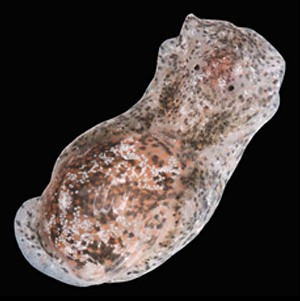
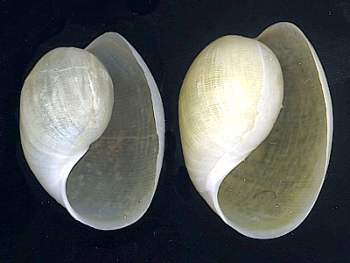
Haminoea antillarum
(d'Orbigny, 1841)
Order: CEPHALASPIDEA
Superfamily: HAMINOEOIDEA
Family: Haminoeidae
DISTRIBUTION
Caribbean, West Atlantic [Gulf of Mexico, Yucatan, West Indies, northeastern Brazil]
PHOTO
Upper: Long Key, Florida Keys, Florida, USA. 7mm long. 10 June, 2003. Photo: Colin Redfern
Lower: Shells, 19, 22mm length. Laguna de Pasomalo, Cardenas, Cuba. AM C89962. Scan: Holly Barlow.
Known usually from its shell which grows to approx 20mm in length. It is globose and quite swollen in shape. The shell is thin but strong, the colour is greenish yellow, and the surface is covered with microscopic wavy striae. It ranges from western Florida and the Gulf states to the West Indies [Emerson & Jacobson, 1976]. It is found alive in shallow sheltered waters.
References:
• Andrews, J. (1977). Shells and Shores of Texas University of Texas Press/Austin and London, USA. 333 pp.
• Emerson, W.K. & Jacobson, M.K. (1976). The American Museum of Natural History Guide to Shells. Land, freshwater and marine, from Nova Scotia to Florida. Alfred A. Knopf, Inc., New York, USA. 482 pp.
• d'Orbigny, A. (1841). Mollusques. in R. de la Sagra Histoire physique, politique et naturelle de l'ile de Cuba. Paris.: Arthus Bertrand. Vol.1, parts 1-14: pp 1-208
• Redfern. C., 2001. Bahamian Seashells: a Thousand Species from Abaco, Bahamas.
Rudman, W.B., 2003 (September 14) Haminoea antillarum (d'Orbigny, 1841). [In] Sea Slug Forum. Australian Museum, Sydney. Available from http://www.seaslugforum.net/find/hamianti
Related messages
Haminoea antillarum(?) from Bahamas
March 8, 2004
From: Marina Poddubetskaia
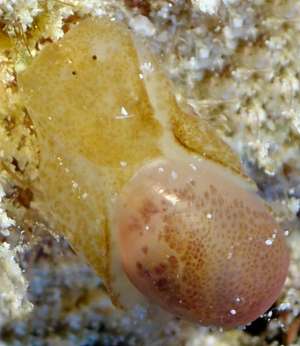
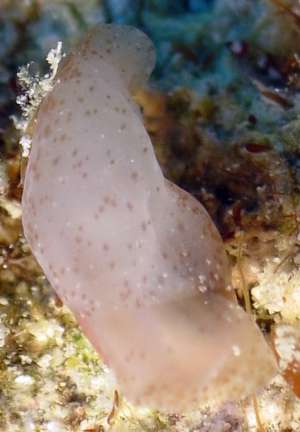
Dear Bill,
While I was in the Southern Bahamas with Anne DuPont, we looked for Haminoea on sandy shallow bottoms. We found several empty shells, but not any living animal, even during the night dive.
One week later I was in the Northern Bahamas and it was a great surprise to find this Haminoea in a deep dive on the seaweed far away from the sand ! It's just the opposite of what I was expecting !
The only one Caribbean Haminoea I know is Haminoea antillarum. Do you think my animal could be this species ? The second photo is the ventral view of this animal.
The collected specimen will be analysed by Manuel Malaquias. I'm collaborating with him for Bulla and Haminoea. So, I hope one day we will be sure about this ID.
Date: February 11, 2004
Location: Bimini Islands, Bahamas, Western Atlantic
Site: Bull Run (The shark dive !)
Depth: 17m
Size: 10-12mm
Photos: Marina Poddubetskaia - Nembro website
Cordially,
Marina.
nembro@nembro.info
Poddubetskaia, M., 2004 (Mar 8) Haminoea antillarum(?) from Bahamas. [Message in] Sea Slug Forum. Australian Museum, Sydney. Available from http://www.seaslugforum.net/find/12353Dear Marina,
As Manuel will tell you, most species of Haminoea have been described from empty shells. If ornithologists described birds just from their bones without any knowledge of their shape or the colour of their feathers, we would think they were rather silly. But that is exactly what has happened with the cephalaspidean bubble shells - there skeleton [the shell] has been described but we know nothing of their animal. There are a number of species of Haminoea described from the Caribbean, but what they look like alive has still to be described. When Manuel identifies this animal be sure to let me know. I will keep your message on the H. antillarum page, but I can't guarantee the identification.
Best wishes
Bill Rudman
Haminoea antillarum from Jamaica
October 12, 2003
From: Ross W. Gundersen
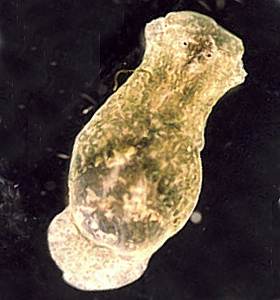
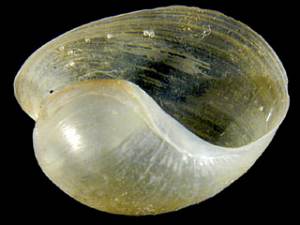
Dear Bill:
Here is another sea slug from Jamaica. As I said in my first message, all specimens were collected from St. Ann's Bay, Jamaica, West Indies. Photo: R. Gundersen.
Here is Haminoea antillarum. Found on sparse Manatee Grass on sand substrate at <1 m depth.
Best wishes,
Ross
ross.gundersen@uwp.edu
Gundersen, R.W., 2003 (Oct 12) Haminoea antillarum from Jamaica. [Message in] Sea Slug Forum. Australian Museum, Sydney. Available from http://www.seaslugforum.net/find/11122Thanks Ross,
Bill Rudman
Re: Haminoea antillarum
September 18, 2003
From: Bill Rudman

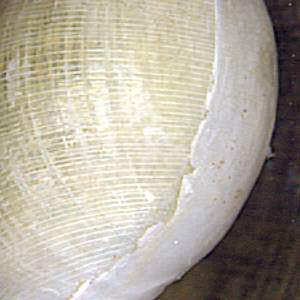
To accompany Colin Redfern's recent message on Haminoea antillarum, here are illustrations of a couple of shells in the Australian Museum collections. They are from Cuba, which is the type locality of the species. The lower scan is a magnification to show the shell sculpture and the relatively heavy calcification of the inner lip.
• Length: 19, 22mm. Laguna de Pasomalo, Cardenas, Cuba. AM C89962. Scan: Holly Barlow.
Best wishes,
Bill Rudman
Haminoea antillarum from Florida
September 16, 2003
From: Colin Redfern

Dear Bill,
Attached for the Forum is a photo of Haminoea antillarum (d'Orbigny, 1841) from Florida, USA. The 7mm specimen was collected June 10, 2003 from Sargassum that was attached to the substrate in 1m at Long Key in the Florida Keys.
Best wishes,
Colin
bahamianseashells@att.net
Redfern, C., 2003 (Sep 16) Haminoea antillarum from Florida. [Message in] Sea Slug Forum. Australian Museum, Sydney. Available from http://www.seaslugforum.net/find/10350Thanks Colin,
In most books only the shells of these animals are usually illustrated. In fact most species of Haminoea were described from their shells alone, so it is good to get photos of the animals.
Best wishes,
Bill Rudman
